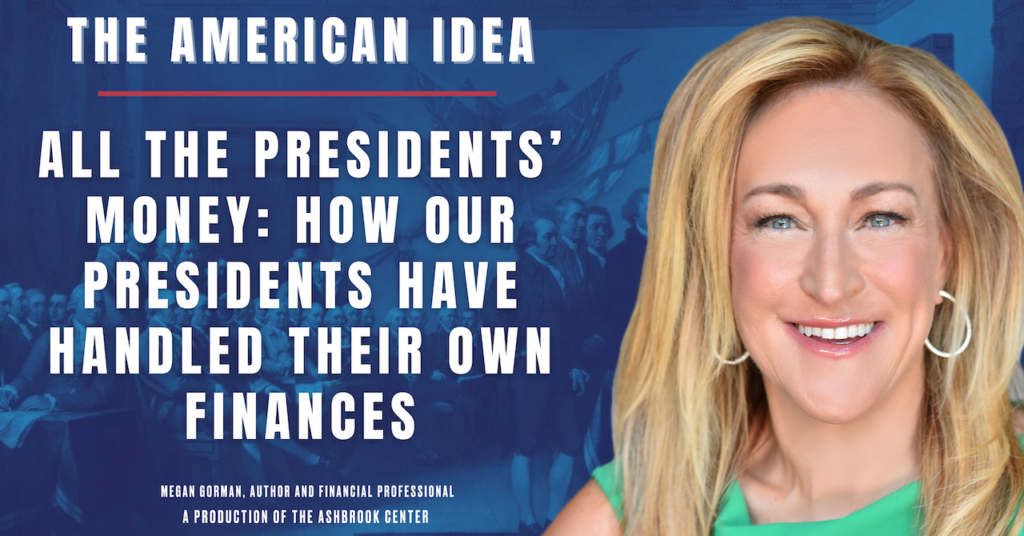All the Presidents' Money: How Our Presidents Have Handled Their Own Finances
June 25, 2025

Listen and subscribe to the podcast
Join The American Idea’s Listener Email list – get news about upcoming episodes and a chance to offer questions for them, too!
Money troubles, it seems, afflict even those who reach the highest office in the land. Behind the marble monuments and official portraits lie financial stories that mirror our own struggles, albeit on a grander stage. From Washington’s meticulous ledgers to Jefferson’s mounting debts, the fiscal journeys of American presidents reveal something profoundly human about leadership and the relationship we all have with money.
The Resilient and the Fragile
Financial resilience—the ability to weather economic storms and recover from setbacks—isn’t simply about wealth. As the Federal Reserve notes, approximately half of Americans cannot handle an unexpected $400 expense, a stark illustration of financial fragility that crosses economic lines. Even those who appear financially secure can struggle with money management, suggesting that resilience involves more than just accumulating assets.
Presidents, despite their power and privilege, were not immune to these challenges. Abraham Lincoln’s early financial difficulties gave way to greater prudence as he matured. Thomas Jefferson, for all his intellectual brilliance, never mastered financial stability. Their struggles remind us that money management is not merely mathematical but deeply psychological, influenced by personality, upbringing, and personal values.
The human dimension of presidential finances emerges clearly in their private correspondence. George Washington, revered as an almost mythic figure, fretted about his financial situation and reputation in personal letters. Lyndon Johnson and Harry Truman experienced financial stress that kept them awake at night. These moments of vulnerability humanize figures often viewed as untouchable, revealing that wealth worries are universal, affecting even those with enormous power.
Early Lessons and Lasting Habits
The roots of financial behavior often trace back to childhood. Herbert Hoover’s Quaker upbringing instilled financial discipline that would later serve him in feeding post-war Europe. Calvin Coolidge’s modest New England background fostered a thriftiness he maintained even in prosperity, advocating for prudence during the roaring twenties.
George Washington’s journey illustrates how circumstances shape financial identity. Though he inherited land, his father’s death left him with minimal support. He built wealth through diligence, managing his estate and operations with remarkable attention to detail. Even during the Revolutionary War, Washington meticulously documented expenses and managed his plantation affairs remotely. This blend of inheritance and self-made success shaped his approach to both personal finances and national leadership.
Thomas Jefferson presents a striking contrast. Despite his intellectual gifts, Jefferson struggled with financial management throughout his life. His estate at Monticello, while architecturally magnificent, became a financial albatross. Unlike Washington, Jefferson deferred financial concerns and avoided confronting problems directly. His wealth, largely tied up in land and enslaved people, created liquidity problems that haunted him into his final years. This financial mismanagement ultimately led to the auctioning of Monticello after his death, a poignant epilogue to a brilliant but financially troubled life.
The Architecture of Financial Security
Building financial resilience requires more than prudent saving—it demands particular personal attributes and experiences. Strong values and education form the foundation, as seen in presidents like Coolidge whose thriftiness reflected deeper principles. Comfort with calculated risk-taking also proves essential, as does the ability to envision and plan for one’s future self.
This capacity to connect with one’s future needs—to save for retirement or prepare for contingencies—appears critical. Some presidents, like Jimmy Carter, consistently made decisions supporting long-term financial security. Others, like Jefferson, struggled to project future financial requirements effectively, creating a disconnect that led to lifelong instability.
Self-esteem may play a surprising role in this dynamic. Those with lower self-regard may struggle to plan effectively, not seeing their future selves as worthy of investment. This psychological factor can lead to postponed budgeting, unaddressed debt, and other detrimental financial behaviors.
Consistency and diligence also emerge as crucial elements. Carter’s methodical approach to money management exemplifies how steady habits contribute to stability. Equally important is one’s choice of partner—Carter’s wife Rosalynn demonstrated remarkable skill in maintaining family finances, highlighting how a spouse’s financial values significantly impact overall resilience.
Legacy Beyond the Dollar
The financial stories of presidents offer more than historical curiosity—they provide a lens through which to understand leadership character. Washington’s careful financial stewardship, even at personal cost, reflected his broader commitment to integrity and accountability. His focus on reputation and long-term thinking influenced both his personal affairs and his approach to the presidency.
Joe Biden’s financial journey reveals how personal trauma can shape money decisions. From his family’s post-war financial difficulties to his desire to provide for his children following personal tragedy, Biden’s financial choices often prioritized family security over optimal financial planning. His occasional financial “sloppiness,” such as failing to document a loan to his brother, illustrates how emotional factors can override prudent practices.
Even presidential wealth-building after leaving office tells an illuminating story. Biden’s post-presidential financial success follows a path pioneered by Gerald Ford, who monetized his post-presidency through books, speeches, and corporate board memberships. This model has transformed how former presidents approach their financial futures after leaving the White House.
In examining these presidential financial narratives, we find something universal—the ongoing human struggle to manage resources effectively while navigating life’s uncertainties. Their stories remind us that financial resilience isn’t simply about wealth accumulation but about the values, habits, and psychological factors that shape our relationship with money. In this way, even the most exalted leaders share common ground with ordinary citizens, wrestling with financial decisions that reflect who they are and who they hope to become.

